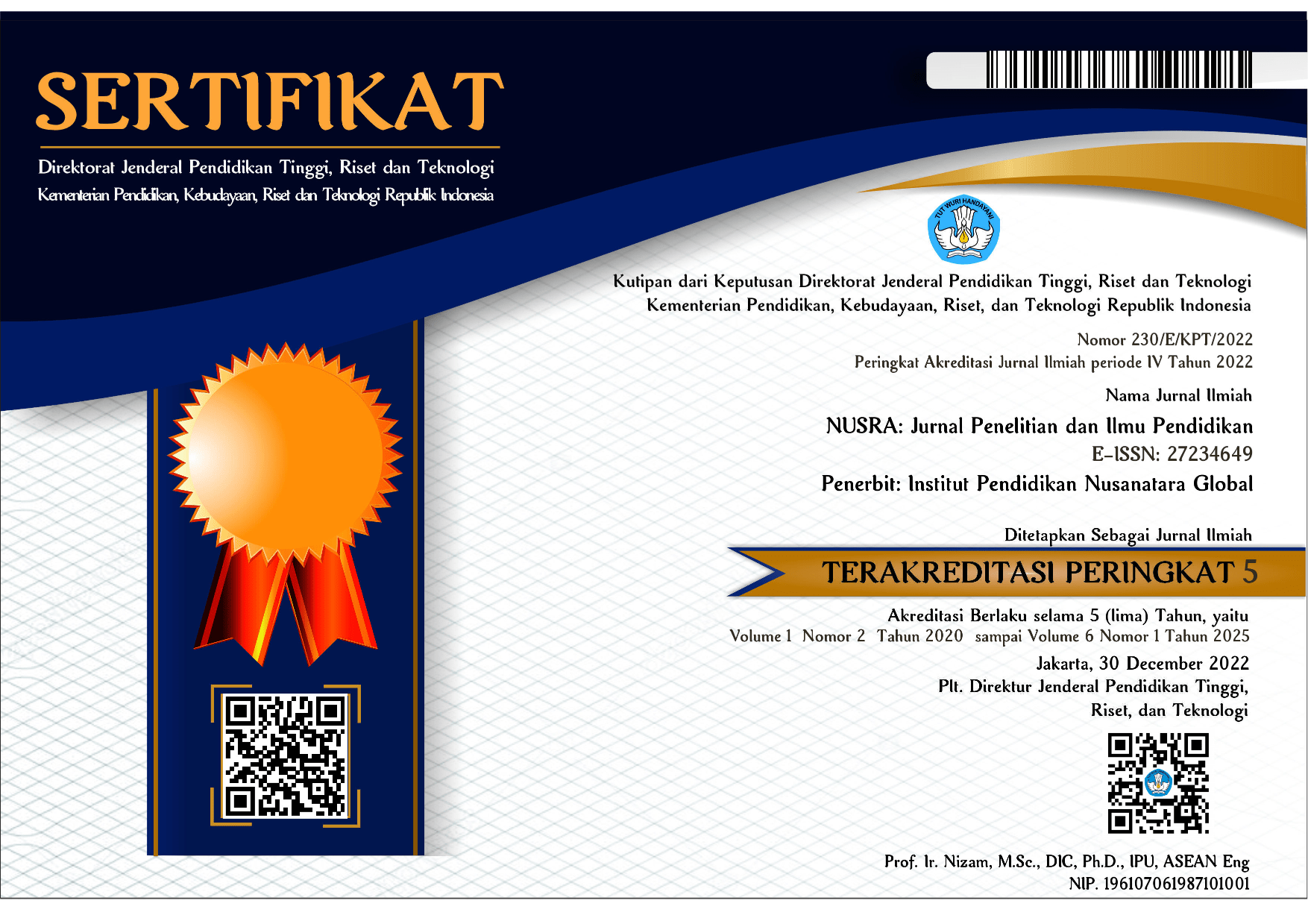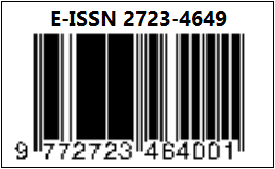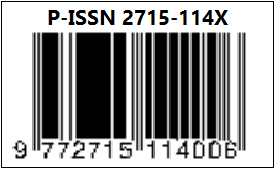HUBUNGAN POLA ASUH ORANG TUA TERHADAP MINDSET REMAJA AWAL DI KOTA BANDUNG
DOI:
https://doi.org/10.55681/nusra.v4i3.1443Keywords:
Growth Mindset, parenting style, Early AdolescentAbstract
Recent research has found that the Growth Mindset increases one's motivation and achievement, both in academics, sports and work (Dweck, 2006). Individuals with a Growth Mindset will live themselves in the learning zone, and understand that their abilities can continue to develop in line with their efforts so they don't give up easily when facing challenges. Mindset is built through experiences and messages that individuals get when interacting with their environment. This study wanted to find out whether parenting style, which is a series of interaction patterns between children and parents (Santrock, 2014), has a relationship with mindset. Research on the relationship between parenting style and mindset of early adolescents will be examined in junior high school students in "X" Bandung City. It is planned that the research will involve 500 students. Parenting style will be measured using the Scale of Parenting Style constructed by Gafoor & Kurukkan (2014) based on Baumrind's theory, consisting of 38 items which are then translated into Indonesian. Meanwhile, mindset is measured using the Growth Mindset Scale consisting of 8 items constructed by Dweck (1999) and then translated into Indonesian. The expected results can describe whether the type of parenting style is related to the growth mindset of adolescent so that it can provide input to parents in assisting adolescent.
Downloads
References
Bandura, A. (1993). Perceived self-efficacy in cognitive development and functioning. Educational Psychologist. 28, 117-148.
Berk, L. E, (2006). Child Development. New York: Yors[ Pearson.
Darling, N. (2014). ERIC Clearinghouse on Elementary and Early Childhood Education Champaign IL
Darmawan, Sigit, B. (2009) Mindset: Inti Pembelajaran Diri. http://esbedewordpress.com/2009/07/29/pertumbuhan-diri/ diakses 09 Januari 2020
Duckworth, A. (2016). Grit: The Power of Passion and Perseverance. by Scribner
Dweck, Carol S. (2015). Revisits the 'Growth Mindset'. Education Week
Dweck, Carol S. (2006). Mindset: The New Psychology of Success 1st edition. The Random House Publishing Group, New York
Dweck, Carol S.; Walton, Gregory M.; Cohen, Geoffrey L. (2014). Academic Tenacity: Mindsets and Skills that Promote Long-Term Learning. Bill & Melinda Gates Foundation.
Efobi, A. & Nwokolo, C. (2014). Relationship between Parenting Styles and Tendency to Bullying Behaviour among Adolescence. Journal of Education and Human Development. 3(1). 507-521
Erlina, W. (2016). Pola Asuh Orangtua Sebagai Prediktor Kecerdasan Emosional Pada Remaja. Skripsi Program Studi Fakultas Psikologi Universitas Sanata Dharma, Yogyakarta.
Gafoor, Abdul K., & Kurukkan, Abidha. (2014). Contruction and Validation of scale of Parenting Style. Guru Journal of Behavioral and Social Sciences, vol. 2, issue 4, p 315-321.
Grolnick, W. S., & Ryan, R. M. (1989). Parent styles associated with children’s self-regulation and competence in school. Journal of Educational Psychology. 81, 143-154. http://dx.doi.org/10.1037/0022-0663.81.2.143
Gunawan, Adi W. (2007) The Secret of Mindset, Jakarta: Gramedia Pustaka Utama.
Hochanadel and Finamore (2015). Fixed And Growth Mindset In Education And How Grit Helps Students Persist In The Face Of Adversity. Journal of International Education Research – First Quarter 2015 Volume 11, Number 1. The Clute Institute
Kim, J. J., Wu, Qiaobing, Fung, J., Fang, Chao. (2017). Parenting variables associated with growth mindset: An Examination of thress Chinese-heritage samples. Asian American Journal of Psychology, volume 8, Number 2, 115-125. APA
Lau, A. S. (2010). Physical Discipline in Chinese American immigrant families: An Adaptive culture perspective. Cultural Diversity and Etnic Minority Psychology, 16, 313-322. http://dx.doi.org/10.1037/a0018667
Lau, A. S., Fung, J. J., & Yung, V. (2010). Group parent training with immigrant Chinese families: Enhanching engagement and augmenting skills training. Journal of Clinial Psychology, 66, 880-894. http://dx.doi.org/10/1002/jclp.20711
Nixon, E., & Halpenny, A.M. (2010). Children’s Perspectives on Parenting styles and Discipline : A Developmental Approach. Dublin: The Stationary Office
Park, Daeun., Tsukayama, Eli., Yu, Alisa., Ducworth, Angela L. (2020). The development of grit and growth mindset during adolescence. Journal of Experimental Child Psychology. 198 (2020) 104889. http://doi.org/10.1016/j.jecp.2020.104889
Santrock, John W. (2014). Life Span Development. New York: McGraw-Hill Education
Syamsu, Yusuf. (2000). Psikologi Perkembangan Anak dan Remaja. Bandung: Remaja Rosda Karya.
Downloads
Published
How to Cite
Issue
Section
License
Copyright (c) 2023 NUSRA: Jurnal Penelitian dan Ilmu Pendidikan

This work is licensed under a Creative Commons Attribution-ShareAlike 4.0 International License.














